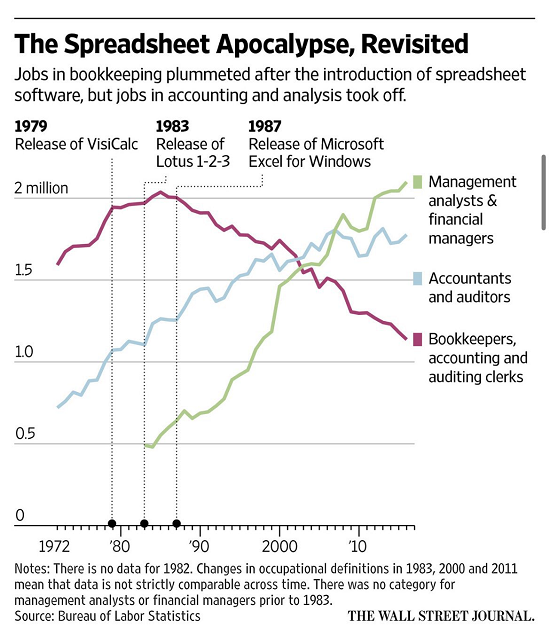
So what takes place if AI destroys both profits (due to it being “complimentary” and a freely distributed product) and jobs?
Setting aside sensationalist dystopian worries of AI taking over our Spaceship (“I’m sorry, Dave. I’m afraid I can’t do that,” the well-known line from the film 2001: A Space Odyssey), let’s concentrate on two more practical possibilities:
1. Per my article What If AI Is Only an Expense and Not a Revenue Treasure trove?, AI is currently a product and therefore there is no way to establish withstanding profits as rivals have the very same tools, much less grow high-profit trillion-dollar monopolies such as Google, Apple or Microsoft based on commoditized AI.
2. AI eliminates tasks which are not changed by a massive wave of new tasks, a process referred to as technological job displacement (the elimination of tasks when human workers are changed by technology).
The financial expert John Maynard Keynes talked about the capacity of technological task displacement to disrupt the economy and society, as the gains (greater corporate profits and efficiency) would be surpassed by the loss of broad-based, stable employment.
I am doubtful of the claims that 10s of countless jobs will be lost due to LLM AI (big language model) or machine-learning AI. I discussed the limitations of AI and technology in my book Will You Be Richer or Poorer?: Profit, Power and A.I. in a Shocked World.
It seems more likely that these AI tools will increase the efficiency of competent human workers instead of entirely replace skilled human employees.
However for the sake of argument, let’s presume the projections of 30 million tasks will be lost will prove precise.
Optimists point to the exceptional success of innovation in producing new tasks as quick as old ones are lost. Hence factory jobs were replaced by brand-new service-sector jobs. The chart listed below highlights one specific technological advance– spreadsheets such as Microsoft Excel (Multiplan on the initial Mac, in a bit of tech nostalgia)– which lots of feared would wipe out accounting jobs.
These tools did significantly lower bookkeeping work however they developed many more jobs in auditing, accounting and financial analysis.
This history recommends to lots of that AI will create countless brand-new jobs within the AI industry.
The evidence is in fact not quite so clear that this new task production is foreseeable. The number of jobs in high tech has actually been incredibly stable for several years. The advance of new innovations hasn’t doubled or tripled the variety of jobs in high tech.
If Elon Musk’s current drastic decrease in the number of Twitter staff members is any indicator, it appears much of the tasks within Big Tech– especially the non-engineering sectors– are unnecessary, even without AI.
To put it simply, we may discover that AI provides the worst of both worlds: it slashes revenues as everybody loads up on the higher costs of AI but without any withstanding competitive advantage that would support greater prices and earnings, and it displaces broad swaths of human labor that are not replaced with brand-new sectors creating 10s of millions of new jobs.
The whole point of AI, after all, it that it discovers by itself and repairs its own coding. Simply put, the entire point is the removal of human labor from the procedure of improvement and debugging.
Yes, there will always be human oversight and input– for example, “We Are Grunt Employees”: The Lowly Humans Helping Run ChatGPT Make Just $15 Per Hour— however there is no assurance the scale of such work will amazingly equate to the jobs lost.
There is a feedback loop to job losses that aren’t changed, something Keynes acknowledged: when individuals lose their earned income and depend on joblessness or perhaps Universal Standard Income (UBI), their earnings is usually lower and they’re no longer able to spend and consume as much as when they worked. The whole economy diminishes.
In the idealized world of UBI supporters, corporations will always be exceptionally rewarding therefore we can pay for UBI by taxing corporations and the wealthy who receive the dividends, stock alternatives and capital gains produced by immensely profitable corporations.
So what happens if AI damages both revenues (due to it being “totally free” and a freely distributed product) and tasks, specifically the sort of higher paying jobs that have been invulnerable to the technological displacements that have wrecked working-class employment in factories and low-skill work?
Ironically, it’s the high-skill manual work tasks that are least most likely to be replaced by AI. Even so-called low-skill labor isn’t as simple to change as many assume. As numerous have kept in mind, “ChatGPT can’t make a hotel bed.”
While videos of robotics that can leap and dance are plentiful, can the robot clean a hotel room for a total lifecycle expense that’s less than a human housemaid? Recall that robotics are costly, need to be maintained and charged, and so on. By the time a robot is established that can do all the tasks of cleaning an unpleasant hotel room, lift the heavy bed, place brand-new plastic garbage bags in the bins, and so on, will it truly be cheaper than human labor? It’s an open question since the many tasks that should be performed need a terrific many different levels of strength and mastery.
The core presumptions at work in the optimistic view are: AI will provide unknown revenues by means of the decrease of human labor and millions of new jobs will be developed by AI. Both assumptions are essentially based upon the magic of history duplicating itself rather than on the fundamentals of AI, the source of earnings and the creation of tasks, which primarily must produce a reliable earnings for the company.
These concerns ought to generate discussions about essential changes we might make in how labor and capital (i.e. technology) are treated. For instance, what if the 15.3% tax on labor for Social Security and Medicare (the integrated company and staff member taxes) and the earnings tax on earned income from labor (up to 37%) for all however super-high earners were removed and those taxes were instead packed onto capital and innovation?
Simply put, what if capital carried a 50% tax rate and labor was untaxed listed below $200,000 per individual? How would that alter the expenses and benefits of labor and capital?
We as a society may be forced to entertain these tradeoffs in methods few appear to expect.

This essay was first published as a weekly Musings Report sent out solely to subscribers and patrons at the $5/month ($50/year) and higher level. Thank you, Patreon customers, PayPal and Substack customers, for supporting my work and free website.
 My brand-new book is now offered at a 10% discount ($8.95 ebook, $18 print): Self-Reliance in the 21st Century.
My brand-new book is now offered at a 10% discount ($8.95 ebook, $18 print): Self-Reliance in the 21st Century.
Check out the very first chapter free of charge (PDF)
Read excerpts of all three chapters
Podcast with Richard Bonugli: Self Reliance in the 21st Century (43 minutes)
My recent books:
The Asian Heroine Who Seduced Me (Novel) print $10.95, Kindle $6.95 Read an excerpt free of charge (PDF)
When You Can’t Go On: Burnout, Numeration and Renewal $18 print, $8.95 Kindle ebook; audiobook Check out the very first section for free (PDF)
Worldwide Crisis, National Renewal: A (Revolutionary) Grand Strategy for the United States (Kindle $9.95, print $24, audiobook) Check Out Chapter One free of charge (PDF).
A Hacker’s Teleology: Sharing the Wealth of Our Shrinking World (Kindle $8.95, print $20, audiobook $17.46) Check out the first section for free (PDF).
Will You Be Richer or Poorer?: Revenue, Power, and AI in a Distressed World
(Kindle $5, print $10, audiobook) Check out the very first area totally free (PDF).
The Experiences of the Consulting Thinker: The Disappearance of Drake (Novel) $4.95 Kindle, $10.95 print); read the first chapters for free (PDF)
Money and Work Unchained $6.95 Kindle, $15 print) Check out the first area totally free
Become a $1/month customer of my work via patreon.com.
Register for my Substack for free
NOTE: Contributions/subscriptions are acknowledged in the order received. Your name and email remain personal and will not be offered to any other individual, business or company.
|
Thank you, Joel M. ($5/month), for your marvelously generous Substack subscription to this website– I am significantly honored by your support and readership. |
Thank you |
, David W. ($5/month), for your splendidly generous Substack membership to this site– I am significantly honored by your support and readership. |
|
Thank you, samchapjoe ($5/month), for your fantastically generous Substack subscription to this website– I am greatly honored by your assistance and readership. |
Thank you |
, Jim M. ($5/month), for your outstandingly generous Substack subscription to this website– I am considerably honored by your support and readership. |

